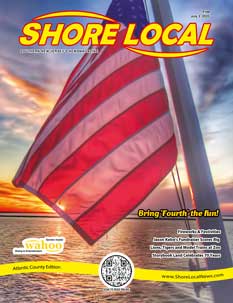The following is the second part of a two-part story:
By William Kelly
As golfers Arnold Palmer, Stan Dudas and Ronnie Ward were mingling with their fellow golfers at Fred Waring’s Shawnee-on-Delaware Pocono resort, Palmer’s attention drifted to his surroundings.
It was September 1954, and Palmer, fresh off of winning the US Amateur Championship. They were at the Shawnee Inn for the Waite Memorial, an amateur golf invitational sometimes referred to as the Young Masters.
“There were these cute girls around. Fred’s daughter, Dixie, was a cutie pie, and her friend, Winnie, was as cute as a bell,” Ronnie Ward said of the encounter.
It was Winnie Walzer who caught Palmer’s eye.

In his autobiography, “A Golfer’s Life,” Palmer wrote, “the tournament festivities began over Labor Day weekend. We arrived on Monday and checked into the Shawnee Inn. I immediately went out on the golf course to play a practice round, and as I was coming back into the inn, I saw a couple of pretty girls coming down the stairway that led to the main lobby.
“One of them was Dixie Waring, Fred’s daughter. But it was the quieter, prettier, dark-haired one that really caught my eye. She had smoky good looks, and her demeanor had a clear sheen of class.”
Dudas recalled that they played some golf and then mingled around the clubhouse until at some point Palmer just blurted out, “Who is that girl?,” speaking about Winnie Walzer.
“When Arnie met Winnie, it was love at first sight,” said golfer Howard Everett, but there still had to be formal introductions.
Fred (Waring) had a secretary, Cora Ballard, who was good at things like that,” said Ward, “and she probably introduced them formally.”
“All these years later it amuses me how many people claim they had the critical hand in bringing us together,” said Palmer.

“Winnie, I began to learn that night, was unlike any girl I ever met; not just pretty and comfortable in almost any social situation, but also smart, well traveled. She had pluck and ambition, and she didn’t suffer vain or pretentious fools easily.
“Her mother, Mary, was something of a sweet social butterfly who may have entertained hopes that Winifred would become a proper debutante in due course, but feisty Winnie Walzer wanted none of that. We became inseparable for the rest of the week.”
The electricity between Arnie and Winnie didn’t go unnoticed and even played into the odds on the tournament.
“Arnie’s walking around holding Winnie’s hand, and I’m betting against him in the tournament,” recalled Ward, “because my boss, the golf pro Harry Obitz, always said, ‘Don’t mix girls and golf.’ So during the tournament I bet against Arnie. But he could hold Winnie’s hand and still beat everybody, and he won (the tournament).”
“Nobody had to bring us together or promote the match,” noted Palmer. “By Friday night my amateur partner, Tommy Sheehan, and I were leading the tournament; but more importantly, I was completely taken with Winnie Walzer and a plan was forming in my brain. At the dinner, I reached under the table and took her hand and said, ‘What would you think if I asked you to get married?’”

“The question appeared to startle her, though only for a second or two. ‘Well, I don’t know. This is so sudden. Can I have a day to think about it?’ she replied.”
“‘Not too long,’ I said to her. ‘I have places to go.’ I told her my grand plan: we would get married in the spring and use the Walker Cup tournament (in England) as our honeymoon.”
Palmer said it’s no surprise that word quickly leaked out about the proposal.
But things had changed in the meantime. For one, while Palmer won the money to buy Winnie an engagement ring by playing his boss and a few friends over three rounds at Pine Valley, he suddenly decided to turn pro.
As Ron Ward points out, “Back in those days it was better to stay amateur because there wasn’t that much money in turning pro, so amateurs stayed amateurs, they didn’t turn pro.”
But for a guy like Palmer and Walter Hagan ahead of him, he could envision the ability to take his game, and golf itself, to another level.
But how to break the news to Winnie?
“We met in the afternoon. I told her I was turning professional, certainly before the start of the new tour season out West. England and the Walker Cup were out; the uncertain life of a tour rookie’s bride was in. Her face fell, but she didn’t seem as upset as I thought she might be at this idea.”
So instead of getting married in a big church wedding with a reception with all their friends and family back at the country club, they eloped to Falls Church, Va., not far from the home of Palmer’s sister, Cheech, where they were married.
As Palmer put it, “We spent our honeymoon night at a trucker’s motel off the Breezewood exit of the Pennsylvania Turnpike. It wasn’t terribly romantic, and in retrospect, it makes me realize what a true gem I had found in Winifred Walzer. Here was this classy, educated, beautiful girl who risked her father’s eternal wrath and gave up her girlhood wedding dreams. and goodness knows what else, to follow a guy who’d never made a plugged nickel as a professional golfer.”
And so they set out on the pro tour and hitched a trailer to their car like vagabonds. At the same time, television had started to broadcast tournaments. They slowly picked up Arnie’s Army, took golf to primetime, and brought millions of new amateur players into the game. And things have never been quite the same since.
William Kelly is the author of “Birth of the Birdie – The First 100 Years of Golf at Atlantic City Country Club,” and is currently writing “The Flight of the Eagle,” on the growth of golf in America. He can be reached at Billykelly3@gmail.com.













